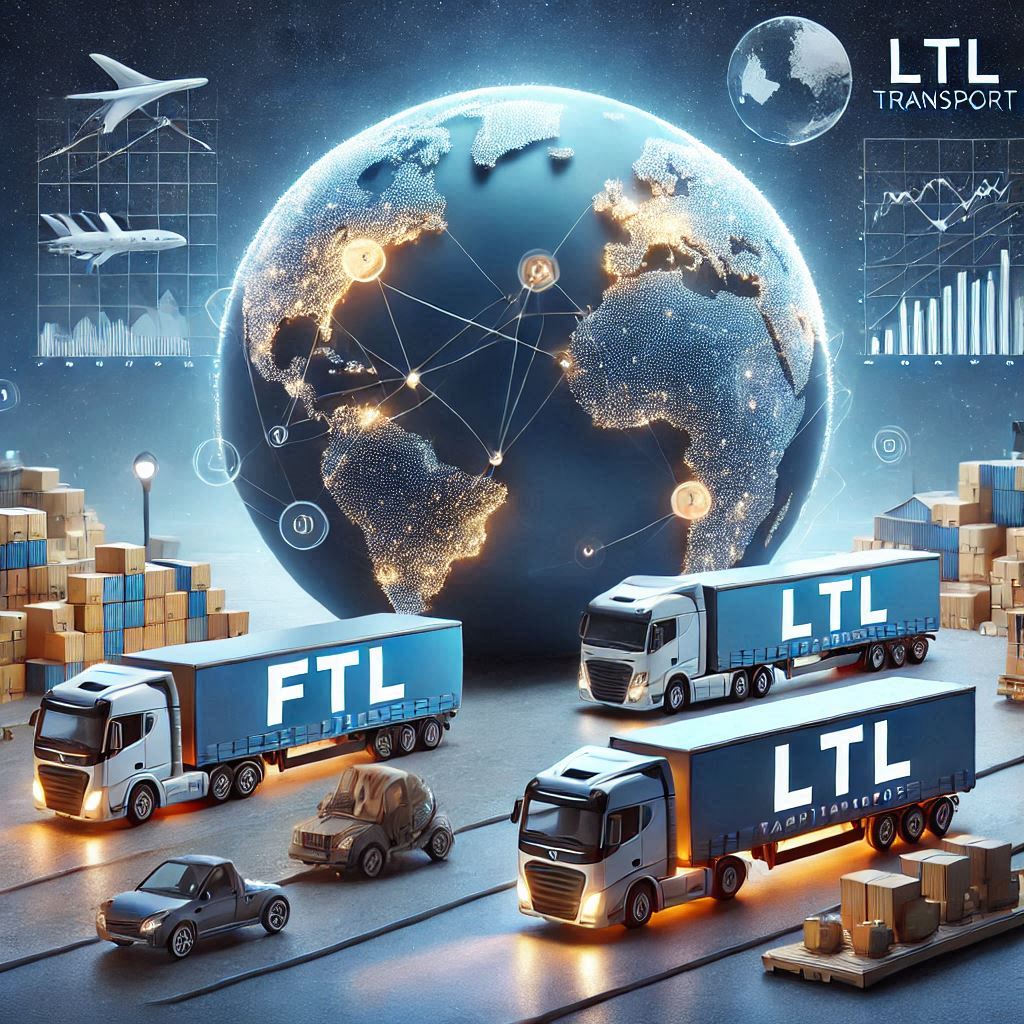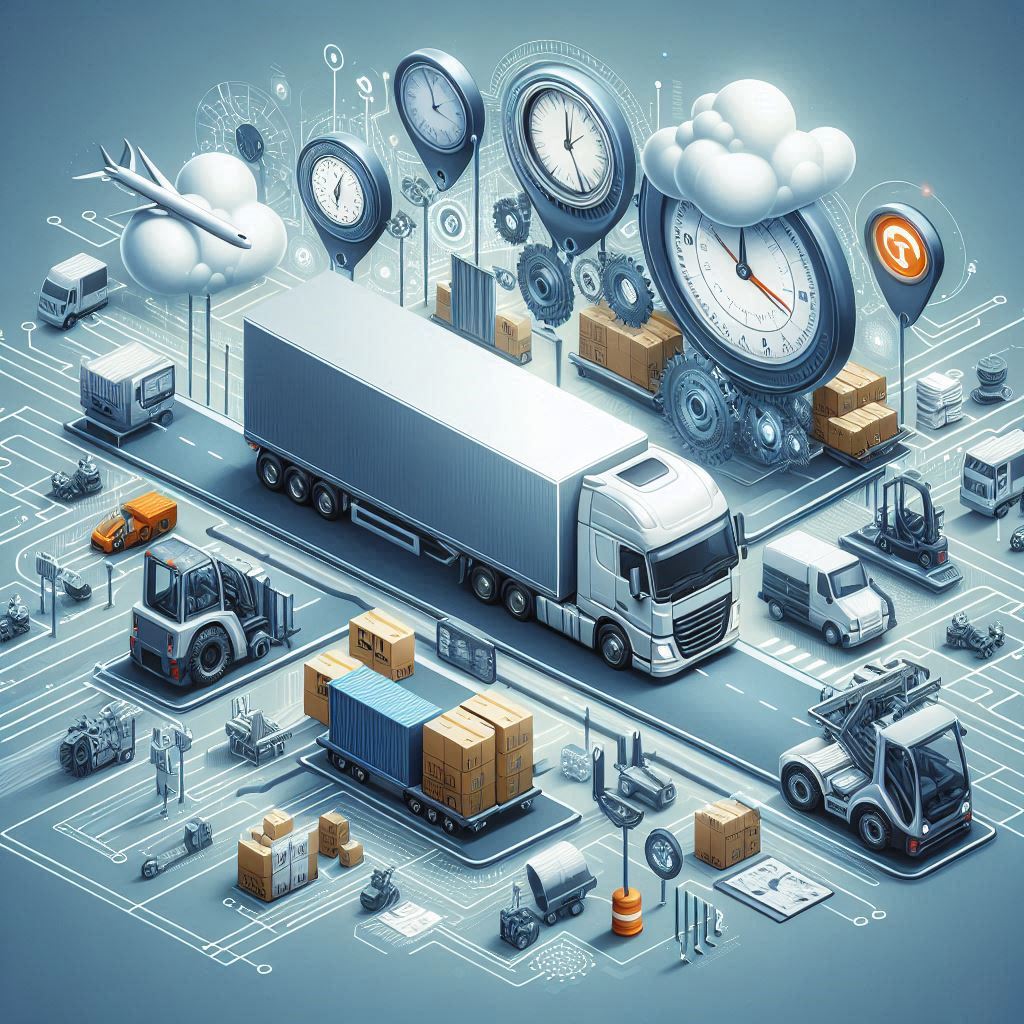FTL and LTL transportation - what are the differences in transportation?
Transportation is a key component of logistics, and understanding its various forms, including FTL and LTL, is essential for effective supply chain management. In this article, we will take a detailed look at the differences between these modes of transportation, their uses, and their impact on costs and delivery times.
What is transportation?
Transportation is the process of moving goods from one place to another, which is a key component of logistics. It includes various methods such as road, rail, sea and air transportation. Transportation is intended not only to deliver goods, but also to ensure their safety and integrity during movement. In the context of FTL and LTL transportation, the definition refers to different ways of organizing transportation that are tailored to the specifics of shipments and customer needs.

Definition of transportation
Transportation is an activity that involves transporting cargo from point A to point B. Within this definition, we distinguish between full truckload (FTL) transportation and less-than-truckload (LTL) transportation. FTL transport refers to situations where a vehicle is fully loaded by a single shipper, while LTL transport refers to transports where the cargo comes from different shippers, thus sharing cargo space and reducing costs.
Types of transportation
Transportation is divided into several types, including land, sea, air and intermodal. Land transportation, including FTL and LTL, is most often used for domestic transport and regional deliveries. Sea transport is preferred for large cargoes over long distances, while air transport is the fastest, but also the most expensive option. The choice of the appropriate mode of transportation depends on the specifics of the goods, costs and delivery time requirements.
The importance of transportation in logistics
Transportation plays a key role in logistics, as without it it would be impossible to effectively manage the supply chain. Adequate transportation ensures timely delivery of goods to customers, which affects customer satisfaction and loyalty. Efficient transportation also contributes to the reduction of operating costs, which is particularly important in competitive markets, and also affects delivery times for FTL and LTL transport.
FTL transport
What is FTL transportation?
FTL, or Full Truck Load, transportation is a method of transportation in which the entire cargo space of a truck is used by a single shipper. This offers an ideal solution for businesses that need to transport a large volume of goods, consisting of a single load. With direct FTL transportation, from shipper to consignee, delivery times are reduced and the risk of damage to goods is minimized. Customers pay for the full load area, making this method cost-effective, especially for food products with a short shelf life.
Advantages and disadvantages of FTL transport
FTL transportation has many advantages, such as faster delivery times and less risk of damage to goods, since the carrier only handles one load. Direct carriage eliminates intermediate unloading points, which also contributes to organizational simplicity. However, the cost of FTL transportation can be unaffordable for smaller shipments, as customers are required to pay for the entire cargo space, even if it is not fully utilized. Additionally, FTL can be less flexible to changing customer needs, which can create challenges in logistics.
Examples of FTL applications
FTL transportation is used in many industries where large quantities of goods must be transported. Examples include transporting construction materials, large machinery or food products such as meat, fruits and vegetables. FTL is also preferred when delicate items that require special handling are being transported. In situations where delivery time is crucial, FTL transportation is the best solution, allowing goods to be delivered quickly and safely to the recipient.
LTL transportation
What is LTL transportation?
LTL, or Less Than Truck Load, transportation is a method of transportation that allows available cargo space to be shared between different shippers. Customers pay only for the space occupied by their cargo, making this method more cost-effective for smaller shipments. It is ideal for transporting smaller goods, such as pallets, furniture or smaller quantities of construction materials. However, LTL involves longer delivery times, as the driver stops at different points to unload goods for different customers.
Advantages and disadvantages of LTL transportation
LTL transportation has its advantages, including lower freight costs because customers pay only for the cargo space used. In addition, LTL is more flexible, allowing transportation to adapt to customers' changing needs. The disadvantage of LTL, however, is longer delivery times because the carrier handles multiple points, which increases the risk of damage during handling. LTL can also be less predictable in terms of delivery times, which can be problematic for goods that require fast turnaround.
LTL transportation - what does it mean and what are the differences between FTL and LTL?
LTL (Less Than Truck Load) transport is a type of less-than-truckload (LTL) transport, where the cargo does not occupy the entire cargo area of the vehicle. Unlike FTL (Full Truck Load) transport, the cargo space is shared between different shippers.
What is LTL transportation?
LTL transportation enables the transportation of smaller shipments that do not require the entire cargo space of a truck. The carrier combines cargo from different shippers, optimizing transportation costs. This is a solution for entrepreneurs who do not generate large volumes of goods.
Differences between FTL and LTL transportation
FTL transport
- All-vehicle transportation of goods
- Direct delivery from shipper to receiver
- Shorter delivery time
- Higher costs
LTL transportation
- Less-than-truckload transportation
- Transshipments during transport
- Longer lead time
- Lower costs for small shipments
Advantages and disadvantages of LTL transportation
Advantages:
- Cost-effective for smaller loads
- Flexibility of supply
- Lower transportation costs
Disadvantages:
- Longer delivery time
- Greater risk of damage to goods
- The need for transshipment
When to choose LTL transportation?
LTL transportation is particularly beneficial when:
- Small batches of goods
- Regular deliveries
- Limited transport budget
- Lack of time pressure
Frequently Asked Questions:
What is FTL and LTL?
FTL is full truckload (Full Truck Load), LTL is partial truckload (Less Than Truck Load).
What LTL?
LTL is the transportation of cargo that does not occupy the entire cargo area of a vehicle.
What does LTL mean in the transportation industry?
LTL stands for Less Than Truck Load - less-than-truckload transportation combining cargo from different shippers.
What is the difference between FCL and FTL?
FCL refers to container transportation, FTL refers to road transportation.
View our transportation services
LTL transportation provides a logistical solution for companies needing to transport smaller consignments. The choice between FTL and LTL depends on the specifics of the cargo, budget and time requirements.
Examples of LTL applications
LTL transportation is used for smaller shipments that do not require an entire truck. Examples include transporting single pallets, electronic equipment and building materials in smaller quantities. LTL is ideal for companies shipping goods to different addressees, as it allows shipments to be combined on pallets. For goods that do not decrease in value over time, LTL transportation can be an advantageous solution, allowing savings in transportation costs as well as flexibility in delivery arrangements.
Differences between FTL and LTL transportation
What is the difference between FTL and LTL transportation?
The main difference between FTL and LTL transportation is the size of the shipment and the way it is financed. With FTL transport, the entire cargo occupies the entire cargo space of the vehicle, which means that the customer pays for the full cargo space. In LTL transport, on the other hand, the cargo space is shared between different shippers, which reduces costs for customers who don't have enough cargo to fill an entire truck. FTL transport is faster and safer because it eliminates intermediate unloading points, while LTL involves longer delivery times and a greater risk of damage to goods.
Comparison of FTL and LTL transportation costs
FTL transportation costs are usually higher than LTL because the customer pays for the entire cargo space. However, when the shipment is large enough, FTL transportation can become a more cost-effective solution due to economies of scale. LTL costs are calculated based on the cargo space occupied and shipment classification, which may be more advantageous for smaller shipments. The choice between FTL and LTL should be based on the size of the shipment and the budget available to the customer, which allows for more efficient management of transportation costs.
Optimizing your choice: FTL or LTL?
Optimizing the choice between FTL and LTL transportation depends on the customer's specific needs, such as shipment size, budget and delivery time requirements. Customers should consider whether they have enough goods to fill an entire truck, or whether it would be better to share cargo space with other shippers. For goods that require fast delivery or have a short shelf life, FTL transportation may be more suitable, while for smaller shipments that can be delivered over a longer period of time, LTL transportation is a favorable alternative.
Summary and recommendations
Which type of transportation to choose?
The choice between FTL and LTL transportation should depend on the specifics of the goods and the needs of the company. Entrepreneurs should carefully evaluate their requirements for shipment size, delivery time and budget. For large cargoes that fill an entire truck, FTL transportation will be the best option. On the other hand, for smaller shipments that don't require fast delivery, LTL transport may be more cost-effective. It's also a good idea to consult with an experienced carrier who can help you make decisions and customize your transportation to help you manage your supply chain more efficiently.
Tips for carriers
Carriers should be aware of the differences between FTL and LTL transportation to be able to advise their customers effectively. It is worth investing in technologies that enable route optimization and cargo management, which will improve operational efficiency. A well-organized carrier should also offer flexible solutions tailored to customers' changing needs. It is also crucial to ensure the safety of goods and on-time delivery, which will contribute to customer satisfaction and loyalty to the company, and thus to success in the transportation industry.
The future of FTL and LTL transportation
The future of FTL and LTL transportation will depend on developments in technology and changing market needs. The growth of e-commerce and changes in consumer behavior may influence greater demand for flexible and fast transportation solutions. Carriers will need to adapt their services to meet growing customer expectations, which may lead to further specialization in the FTL and LTL transportation area. Investments in modern technologies, such as supply chain management systems and process automation, will be key to the future of the transportation industry, which will certainly benefit both carriers and their customers.
Q: What are the main differences between FTL and LTL transportation?
A: FTL (full truckload) transport involves carrying a full load in one vehicle, while LTL (less than truckload) transport refers to carrying smaller loads that do not occupy the entire cargo space of a vehicle.
Q: What does FTL stand for?
A: FTL stands for "full truck load," which refers to transportation in which the entire vehicle is filled with cargo from one shipper to one consignee.
Q: What is general cargo transportation?
A: Less-than-truckload transport is a form of transportation in which smaller cargoes are bundled into a single shipment, which is characteristic of the LTL system.
Q: When is it a good idea to choose FTL transportation?
A: It's worth choosing FTL transportation when you have large loads to transport that occupy the entire cargo space of the vehicle, allowing for faster and more efficient transportation without downtime.
Q: What does LTL mean?
A: LTL stands for "less than truckload," which means that the amount of cargo carried is less than the full capacity of the vehicle.
Q: What are the advantages of LTL transportation?
A: LTL transportation is advantageous when transporting smaller loads because it saves costs by sharing cargo space with other shippers.
Q: What are the cost differences between FTL and LTL transportation?
A: FTL transportation costs tend to be higher because they involve full loading and a dedicated vehicle, while LTL cuts costs by sharing cargo.
Q: What are the loading requirements for FTL transportation?
A: For FTL transport, the cargo must occupy the entire cargo space of the vehicle, which means it must be properly prepared for transport.
Q: What are the most common types of cargo in LTL transportation?
A: LTL transport usually carries smaller parcels, pallets and other loads that do not occupy the entire cargo space of the vehicle.







